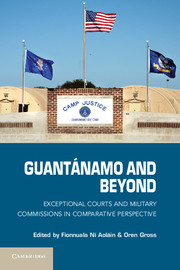Book contents
- Frontmatter
- Contents
- Contributors
- Acknowledgments
- Introduction: Guantánamo and Beyond
- Part I Military Commissions and Exceptional Courts in the United States
- Part II Exceptional Courts and Military Commissions Elsewhere
- Part III International Law, Exceptional Courts, and Military Commissions
- 14 The Right to a Fair Trial in an Extraordinary Court
- 15 Approaches and Responses of the UN Human Rights Mechanisms to Exceptional Courts and Military Commissions
- 16 Exceptional Courts and the European Convention on Human Rights
- 17 The Legitimacy Deficit of Exceptional International Criminal Jurisdiction
- Index
- References
17 - The Legitimacy Deficit of Exceptional International Criminal Jurisdiction
Published online by Cambridge University Press: 05 June 2014
- Frontmatter
- Contents
- Contributors
- Acknowledgments
- Introduction: Guantánamo and Beyond
- Part I Military Commissions and Exceptional Courts in the United States
- Part II Exceptional Courts and Military Commissions Elsewhere
- Part III International Law, Exceptional Courts, and Military Commissions
- 14 The Right to a Fair Trial in an Extraordinary Court
- 15 Approaches and Responses of the UN Human Rights Mechanisms to Exceptional Courts and Military Commissions
- 16 Exceptional Courts and the European Convention on Human Rights
- 17 The Legitimacy Deficit of Exceptional International Criminal Jurisdiction
- Index
- References
Summary
AD HOC INTERNATIONAL CRIMINAL TRIBUNALS HAVE BEEN resorted to with increased frequency in the last eighteen years. Following the early precedents set by the creation of the International Criminal Tribunal for the Former Yugoslavia (ICTY) and the International Criminal Tribunal for Rwanda (ICTR), the international community has supported the creation of hybrid tribunals – staffed by both international and domestic personnel and applying both international and domestic law – with relation to crimes that occurred in Sierra Leone, Cambodia, and Lebanon. Internationalized criminal tribunals were also created in connection with the international community's involvement in East Timor, Bosnia and Herzegovina, and Kosovo. In all of these cases, the international response has been exceptional in nature: institutions were created alongside the ordinary judicial system for a limited period of time, in response to special catastrophic events, for the purpose of handling a select category of past crimes, which were removed, fully or partly, from the ordinary criminal jurisdiction of national courts.
Although constituting a permanent forum of criminal adjudication, the International Criminal Court (ICC) also exercises its jurisdiction in an “episodic” manner – following a Security Council referral or the referral of situations by the territorial or national states, in other words the states in whose territory the crimes have occurred or whose nationals committed them. Hence, it operates in some respects in ways not dissimilar to the manner of operation of special ad hoc or hybrid international criminal tribunals, which are similarly established pursuant to a Security Council resolution or with the consent of the territorial or nationality state. Even the exercise of universal jurisdiction by individual states has strong features of “special” jurisdiction, as the actual practice of states in this field tends to be highly exceptional in nature. Given the irregular and less-than-universal coverage of international criminal jurisdiction, the initiation of international criminal procedures through new or existing judicial institutions is likely to continue to pose attributes of exceptionality in the foreseeable future.
- Type
- Chapter
- Information
- Guantánamo and BeyondExceptional Courts and Military Commissions in Comparative Perspective, pp. 361 - 378Publisher: Cambridge University PressPrint publication year: 2013



